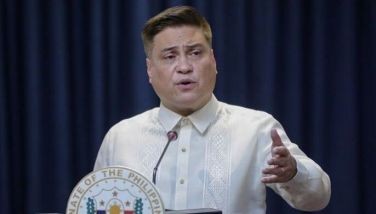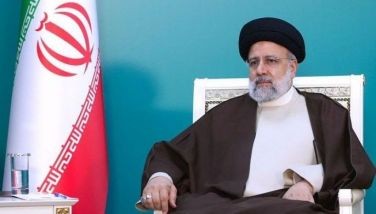United Nations rapporteur seeks reforms in anti-terror, cybercrime laws
MANILA, Philippines — Although freedom of expression is protected by the Philippine Constitution, provisions of some laws in the country are not in line with international standards and good practices, United Nations Special Rapporteur Irene Khan said.
Khan, the special mandate holder on freedom of opinion and expression, has recommended some legal reforms following her 10-day official visit to the Philippines.
Among her recommendations was the amendment of the Anti-Terrorism Act of 2020, which she said has certain provisions that “are not aligned with international standards and guidance.”
“I remain concerned that the law allows the Anti-Terrorism Council to allow arrest of individuals designated as ‘terrorists’ without first obtaining a judicial warrant, contradicting basic due process standards. Judicial oversight is necessary at all phases of the criminal justice system even in terrorism cases,” said Khan.
“The Act also raises additional concerns regarding expanded surveillance, which is having a chilling effect on the legitimate activities of journalists, human rights defenders, civil society activists and the enjoyment of the right to freedom of expression more broadly,” she added.
Khan said she would review, along with the UN special rapporteur on human rights and counterterrorism, the recent rules published by the Supreme Court regarding the Anti-Terrorism Act.
The UN independent expert also pushed for legislation that will decriminalize libel, both offline and online.
“While originally designed to prosecute individuals involved in offenses such as cybersquatting, cybersex and child pornography, the Cybercrime Prevention Act of 2012 has been used to criminalize individuals expressing dissent,” she said.
The provision on cyber libel as well as Articles 353 and 355 of the Revised Penal Code for offline libel “are fundamentally at odds with international standards, in particular the General Comment 34 of the Human Rights Committee,” she pointed out.
Khan noted that several courts in developing countries have called for repeal of criminal libel “as a relic of the colonial past,” adding her belief that decriminalizing libel would send a strong signal of the Philippines’ commitment to accept criticism and debate.
In her exit statement, Khan also pushed for a law that will institutionalize access to information, including maximum disclosure in the public interest.
She noted that the executive order issued by former president Rodrigo Duterte regarding freedom of information “provides for overly broad or vaguely framed exemptions.”
“Exemptions from disclosure should be provided clearly in the law, be narrowly defined, and subject to independent oversight. Guarding data privacy is important but should include a public interest exemption. Reviving trust in government decisions and institutions is only possible through access to information, dialogue, listening to grievances, and, most importantly, adherence to human rights and the rule of law,” Khan said.
Khan will present her full report to the UN Human Rights Committee in June 2025.
Supremely presumptuous
Meanwhile, Sen. Imee Marcos scoffed at Khan’s “supremely presumptuous” call to dismantle the National Task Force to End Local Communist Armed Conflict (NTF-ELCAC).
Marcos said Khan was in the country for just 10 days but speaking as if she knows what is best for the Philippines.
The senator said dismantling the NTF-ELCAC would be “counterproductive, even dangerous.”
The senator also said Khan’s call was “hardly surprising, given her long-standing Amnesty International bias.”
“After a mere 10 days in the Philippines, during which she never visited the NTF barangays but only met a chosen few witnesses, she has the knowledge and the right to tell the Philippine government what to do?” Marcos asked.
“Not only are these foreigners meddlesome and out of their depth, she has also threatened that the Philippines’ ‘ambitious’ plan to lead the UN Commission on the Status of Women and obtain a seat on the UN Security Council depends on conforming with her ‘findings.’ Why exactly did we invite her anyway?” the senator added.
The senator pointed out the NTF-ELCAC is beneficial to the country.
“It is important that we maintain the NTF-ELCAC’s presence and strengthen its mandate to continue the peaceful rehabilitation of rebel returnees,” Marcos asserted.
The progressive group Bagong Alyansang Makabayan has a different view, though, as it called for the resignation of government officials allegedly involved in disinformation and deceit during Khan’s 10-day visit.
In a statement, the group accuses different state agencies of attempting to conceal the true state of free speech in the country by presenting a false narrative of thriving media freedom and denying the existence of an official policy on red-tagging. — Cecille Suerte Felipe, Mark Ernest Villeza
- Latest
- Trending




























